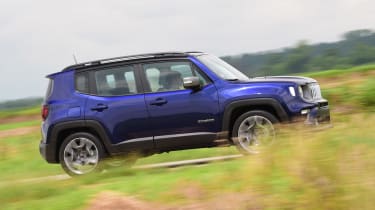Jeep Renegade SUV - Engines, drive & performance
The Jeep Renegade is excellent off-road, but feels vague on it.
With more direct, responsive steering and a tighter turning circle, the Renegade could actually be quite fun to drive. But the MINI Countryman and Ford Puma are still the rivals to go for if you want a driver-focused small SUV. As it is, the Jeep offers plenty of grip, but not much in the way of driver fulfilment on road.
Things are put into sharp perspective, though, by the Renegade’s more off-road-focused four-wheel-drive variants. On rough terrain, those on-road handicaps are transformed into advantages. The heavily damped steering prevents harsh bumps being transmitted to your hands and its slow action makes careful low-speed manoeuvres easier. Despite these impressive capabilities, the Renegade doesn’t feel at all intimidating if you’re moving up from a regular family hatchback.
Petrol engines
The Renegade was originally launched with dated 1.4 and 1.6-litre engines, which were subsequently replaced with more modern equivalents. The three-cylinder 1.0-litre had 118bhp, while the four-cylinder 1.3-litre was available with 148bhp or 178bhp.
We’ve tried both the 118bhp and 148bhp petrol engines, which came with six-speed manual and six-speed automatic gearboxes respectively. These are quick enough for most of the Renegade’s target audience, getting from 0-62mph in 11.2 seconds and 9.4 seconds accordingly. Elsewhere, things are more mixed. Both are quiet on the motorway, but can sound raucous at higher revs. More frustratingly, the engines don’t feel as smooth as we’d like, with a tendency to hesitate when you need their power.
More reviews
In-depth reviews
When available, the 178bhp engine came with all-wheel drive (read our guide to the differences between all-wheel drive and four-wheel drive), and was linked to the same nine-speed auto as the diesel. This was the fastest model in the range, hitting 0-62mph in 8.5 seconds.
The latest engine in the Renegade lineup is a 1.5-litre turbo petrol mild hybrid, which Jeep badges ‘e-Hybrid’. This has 128bhp and can get the small SUV from 0-62mph in 9.7 seconds. It’s fitted with a new seven-speed dual-clutch automatic gearbox
Hybrid engines
Two plug-in hybrid 4xe versions of the Renegade were introduced in 2020, bolstering the power of the 1.3-litre petrol engine with a 59bhp electric motor. As standard the 4xe provides up to 187bhp but the Trailhawk and 2023 Upland Special Edition get 237bhp for extra performance. Petrol power is sent to the front wheels, while the electric motor drives the rear axle to provide four-wheel drive.
The Renegade 4xe feels comfortable to drive, with almost no powertrain noise in its electric mode, accompanied by smooth suspension and decent seats. The Trailhawk offers excellent performance and works even better off-road than the regular model, thanks to its extra pulling power. So far as small SUVs are concerned, only a Range Rover Evoque would be able to compete with the Renegade over difficult terrain.
There's also a Sport mode but it's probably best left alone, because the six-speed automatic gearbox feels lethargic and holds on to gears for too long. With a 0-62mph time of 7.5 seconds (7.1 seconds for the Trailhawk), the Renegade 4xe is the fastest version in the line-up, but it doesn't really have the body control, steering precision or grip to make the most of the extra pace. It rides smoothly, however, and its electric motorway can happily get it to motorway speeds with no help from the petrol engine.
Jeep Renegade diesel engines
Jeep has now discontinued all of the diesel options for the Renegade, including the 2.0-litre Multijet engine with four-wheel drive and 168bhp that was available until most recently. You can no longer buy a 118bhp 1.6-litre diesel or a 138bhp 2.0-litre engine new. The diesel engine’s four-wheel drive meant it was one of the quicker models in the range, getting from 0-62mph in a reasonable 8.9 seconds.
You could only have the top diesel engine with the Renegade Trailhawk, which is by far the most accomplished off-roader in the range. It's nearly unstoppable with the powerful diesel engine and Jeep's nine-speed automatic gearbox. At the flick of the switch, you can engage special low gears that allow the Jeep to keep ploughing on in the trickiest conditions.









